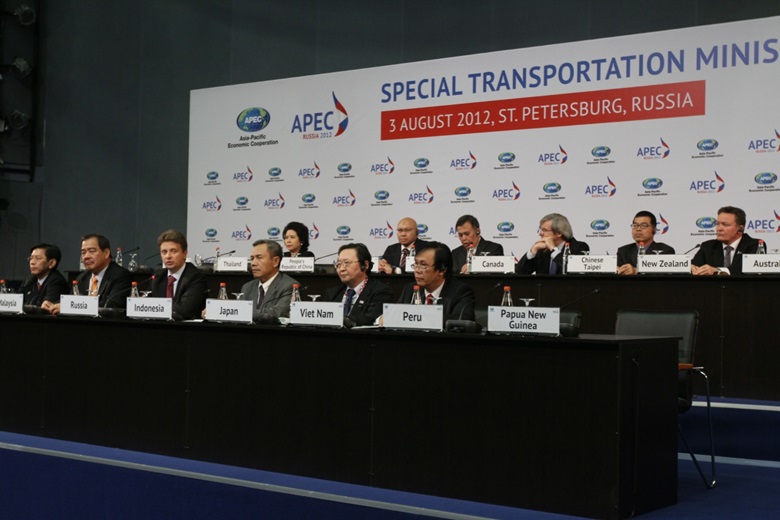2012 APEC Transportation Ministerial Meeting

Development of Integrated Supply Chains for Innovative Growth in the Asia-Pacific Region
- We, the Ministers Responsible for Transportation, met in St. Petersburg, Russian Federation, on August 3, 2012 to discuss steps to ensure the sustainability and efficiency of supply chain systems in the Asia-Pacific region.
- We recognize that reliable supply chains are crucial for maintaining sustainable development and providing economic, energy, food and environmental security in the region and in the world.
- We appreciate the decision of the Russian Federation to emphasize the issue of establishing reliable supply chains during its Chairmanship of APEC in 2012 and to hold a Special Meeting of APEC Transportation Ministers to discuss current challenges and potential areas of supply chain development.
- We affirm the importance of high-level discussion to further liberalize transport services and to work toward simplified and transparent regulations between APEC members in an effort to support the efficient movement of cargo and passengers.
- We acknowledge the ongoing activities of the APEC Transportation Working Group (TPTWG) to study and enhance supply chains, and its role in the implementation of the Supply Chain Connectivity Action Plan.
- We reaffirm our commitment to support our Leaders’ 2010 Declaration, which sets out a goal of a 10 percent increase in regional supply chain performance by 2015.
- In this regard, in order to support trade volume growth in our region, we agree to jointly explore, with industry and relevant stakeholders, opportunities for the diversification of supply chain routes across all modes, the improvement of supply chain connectivity, and the establishment of a logistics information service network in order to yield significant economic benefits in terms of cutting transportation and transaction costs, increasing supply chain efficiency and security, creating, thus, better transit environment for global trade
- We instruct the TPTWG to undertake a comparison study of major existing and potential alternative transportation supply chain routes in order to support both public and private sector in finding, developing and using the most efficient supply chains in order to make transportation faster, securer and greener.
- We support further work on the simplification and harmonization of trade-related procedures between APEC economies in cooperation with relevant sub-fora, notably the Sub-Committee on Customs Procedures (SCCP), which will help to enhance the productivity of supply chains.
- We share a common understanding that in order to ensure connectivity and visibility, supply chains should be considered as a single modern network that is equipped with intelligent technologies such as Intelligent Transportation Systems (ITS), Global Navigation Satellite Systems (GNSS)-based monitoring systems and automated transport management logistic services that protect the interests of both producers and consumers; enhance the quality and speed of delivery; and increase transparency and the ability to better control and track the movement of dangerous goods and hazardous materials.
- We instruct the TPTWG to hold consultations with industry and other stakeholders on the issue of the technological modernization of supply chains, primarily of their weakest links, thus strengthening coordination among supply chain stakeholders in order to use existing infrastructure safer and more effectively.
- We support the creation of a framework to define the important properties of a resilient supply chain, which will improve our understanding of the processes and help strengthen transportation infrastructure. In this regard, we reaffirm our support for TPTWG work to operationalize the APEC Trade Recovery Program by, inter alia, developing an effective communications mechanism for information critical to governments and the private sector during periods when transport systems are constrained.
- We support the idea of identifying best practices for early warning of emergencies to increase the safety of cross-border transportation.
We reaffirm our previous commitments undertaken during the 7th Transportation Ministerial Meeting in San Francisco, California, USA, and agree to meet again in 2013 to discuss the outcomes of our work.

